Improving Demand Generation for COVID-19 Vaccination Through Privately Owned Community Pharmacies
Competent and empathetic health care workers are central to service delivery, including ensuring people get tested for and receive COVID-19 vaccines. Community pharmacists are closest to where people live, work, and play, making them the most accessible health care providers. Recognizing their role as a key actor, Breakthrough ACTION-Nigeria and the Medicines, Technologies, and Pharmaceutical Services (MTaPs) project collaborated with the Oyo State Primary Health Care Board (OYSPHCB) and the Association of Community Pharmacists of Nigeria (ACPN) to create demand for the vaccine. A similar collaboration is also happening in three other Nigerian states.
The work in Oyo State to improve vaccine uptake involved training certified community pharmacists from low-uptake local government areas and hard-to-reach communities to be vaccinators and communicators. They learned to administer the COVID-19 vaccine using the national training curriculum, national reporting data, and an adapted version of Breakthrough ACTION-Nigeria’s Building Trust and Empathy curriculum. Overall, 23 community pharmacists were on COVID-19 vaccine demand generation by August 2022.
By January 2023, Oyo State was standing out during the national quarterly review. When compared to other MTaPS states running vaccination programs, the community pharmacists in Oyo State had administered 91% (6,006 out of the total 6,582) of all vaccinations across the four participating states.
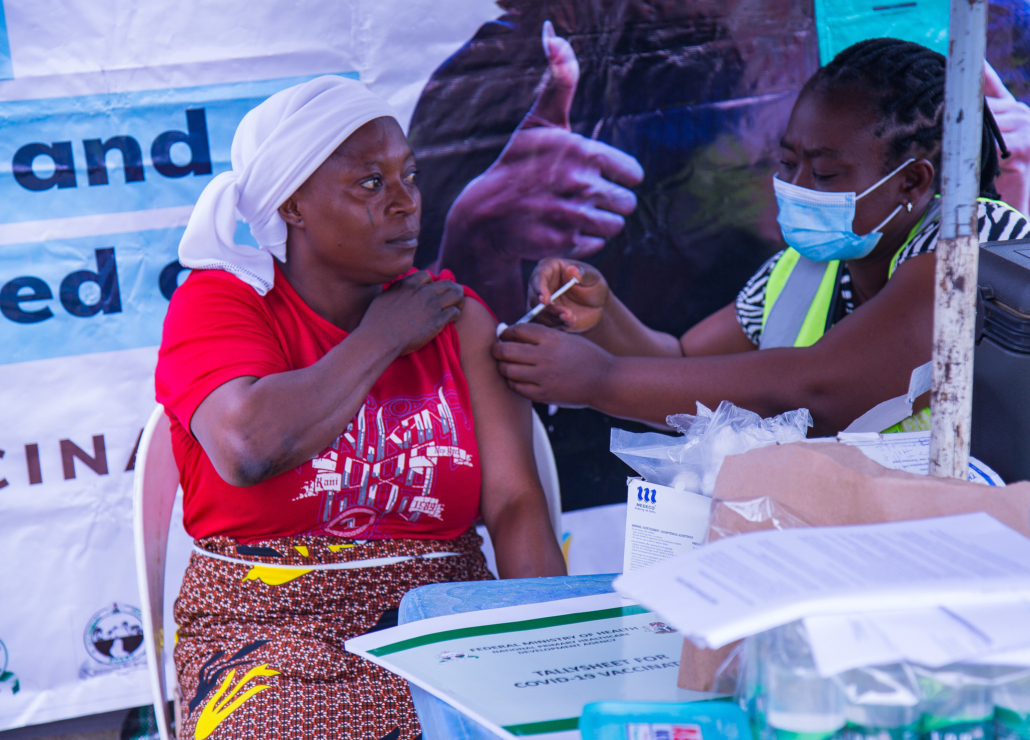
A woman receiving a jab of COVID-19 vaccine from a health worker. Photo Credit: Edoziem Valentine, Program Officer, Knowledge Management and Documentation, Breakthrough ACTION Nigeria
Takeaways
By working with community pharmacists, Breakthrough ACTION-Nigeria learned five lessons:
- Joint collaboration and defined roles with partners ensure smooth implementation: Breakthrough ACTION-Nigeria’s primary responsibility was to strengthen the pharmacists’ communication skills and support demand generation for vaccine uptake. To achieve this, the project collaborated with the following key partners: (1) The OYSPHCB, which led the state’s COVID-19 vaccination efforts, working through and training the community pharmacists, in alignment with the National Primary Health Care Development Agency’s (NPHCDA) strategy; (2) The MTaPS project, whose primary responsibility was ensuring the availability of COVID-19 vaccine commodities and conducting state-level COVID-19 vaccination training for community pharmacists; and (3) the ACPN, which mapped out and identified registered community pharmacists that participated in the initiative. This partnership ensured synergy of expertise culminating in efficient implementation as roles were clearly defined at the onset of the collaboration.
- Working with media to create awareness and build continued trust for community pharmacists is an effective approach: Breakthrough ACTION-Nigeria facilitated a consultative meeting, “Meet the Press,” between the trained community pharmacists and 12 state media partners to publicize the involvement of community pharmacists in delivering COVID-19 vaccine services. During this time, community pharmacists vaccinated 2,247 persons, accounting for 24% of the total number of people vaccinated.
- Conducting mass mobilization activities with community pharmacists make vaccine uptake easier: Breakthrough ACTION-Nigeria collaborated with trained community pharmacies to conduct targeted mass mobilization and awareness campaigns in hard-to-reach locations. This brought about a significant increase in vaccination service uptake at their facilities. In December 2022, the community pharmacists vaccinated 4,487 persons, the most during this initiative’s implementation period. Leveraging community volunteers and town announcers allowed the initiative to reach a broad spectrum of people with key messages and linked them to vaccination services.
- Community pharmacists have gained more trust: The COVID-19 vaccination partnership between NPHCDA and ACPN led to community pharmacists gaining a more elevated and trusted status in their communities. Community members now see these community pharmacists as “saviors,” and this has also increased demand for other services they provide. When people come for other services or to buy medication, the pharmacists sensitize them on COVID-19 and its vaccines.
- Community pharmacists are an available human resource for health: Community pharmacists have additional untapped potential for strengthening primary health care service delivery in Nigeria. They are a reliable, close by, trusted source who can contribute to prevention and treatment during public health emergencies.

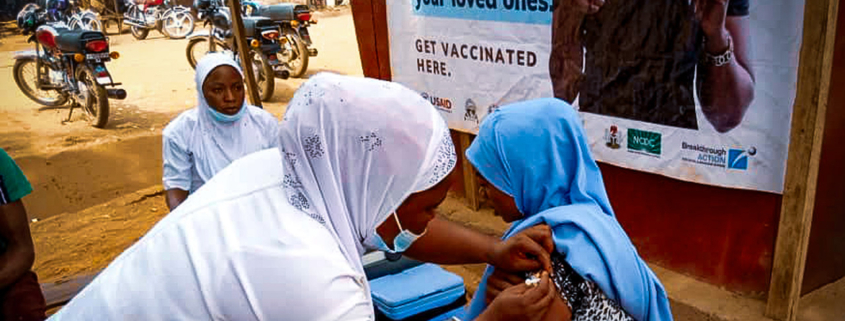 Ramatu Ada Ochekliye/Breakthrough ACTION Nigeria
Ramatu Ada Ochekliye/Breakthrough ACTION Nigeria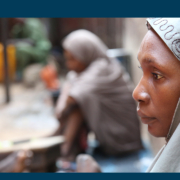
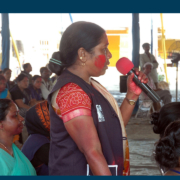 Gopal Bhattacharjee/Photoshare
Gopal Bhattacharjee/Photoshare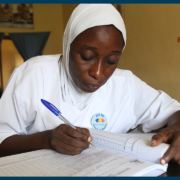 © 2012 CCP/NURHI 2, Courtesy of Photoshare
© 2012 CCP/NURHI 2, Courtesy of Photoshare
 WHO
WHO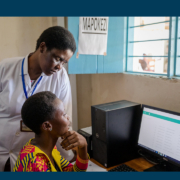 Rachel Chilton/USAID/Flickr
Rachel Chilton/USAID/Flickr